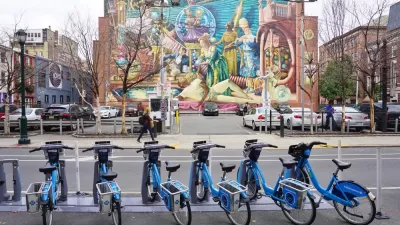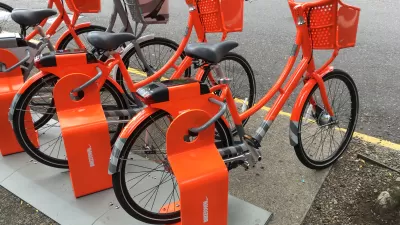While bikeshare garners a lot of attention from the white and wealthy, it is a less obvious choice for low-income communities. Difficulties include weather, time constraints, and overall demand for non-auto modes.

Bikeshare faces a demographic crisis. Often a success where locals are wealthy, it has failed to take root in poorer communities of color, where a greater proportion of bike commuters live. "This is a glaring issue, critics say, especially in places where public money is being used to help bike share systems break even."
Despite efforts by cities like Philadelphia to locate bikeshare stations in poor neighborhoods and allow payment by cash, the system has yet to catch on fully.
Reasons for this disparity coincide with more general transportation challenges low-income neighborhoods face. They include:
- Low-income bike commuters don't necessarily prefer biking, they just can't afford a car.
- Bikeshare is only reliable when the racks contain bikes: if they're all being used, it could mean showing up to work late or not at all.
- In a similar vein, cycling to work (though possible) is less attractive in bad weather. Wealthy bikeshare users could probably choose to drive, but a low-income person solely dependent on bikeshare could not.
FULL STORY: Bike share users are mostly rich and white. Here's why that's hard to change.

Trump Administration Could Effectively End Housing Voucher Program
Federal officials are eyeing major cuts to the Section 8 program that helps millions of low-income households pay rent.

Planetizen Federal Action Tracker
A weekly monitor of how Trump’s orders and actions are impacting planners and planning in America.

Ken Jennings Launches Transit Web Series
The Jeopardy champ wants you to ride public transit.

California Invests Additional $5M in Electric School Buses
The state wants to electrify all of its school bus fleets by 2035.

Austin Launches $2M Homelessness Prevention Fund
A new grant program from the city’s Homeless Strategy Office will fund rental assistance and supportive services.

Alabama School Forestry Initiative Brings Trees to Schoolyards
Trees can improve physical and mental health for students and commnity members.
Urban Design for Planners 1: Software Tools
This six-course series explores essential urban design concepts using open source software and equips planners with the tools they need to participate fully in the urban design process.
Planning for Universal Design
Learn the tools for implementing Universal Design in planning regulations.
Ada County Highway District
Clanton & Associates, Inc.
Jessamine County Fiscal Court
Institute for Housing and Urban Development Studies (IHS)
City of Grandview
Harvard GSD Executive Education
Toledo-Lucas County Plan Commissions
Salt Lake City
NYU Wagner Graduate School of Public Service





























